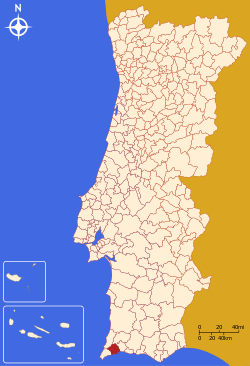Lagos (Portugal)
| Lagos | |||
|---|---|---|---|
| Municipality | |||

Lagos in early-June 2011
|
|||
|
|||
 |
|||
| Coordinates: 37°6′10″N 8°40′22″W / 37.10278°N 8.67278°WCoordinates: 37°6′10″N 8°40′22″W / 37.10278°N 8.67278°W | |||
| Country |
|
||
| Region | Algarve | ||
| Subregion | Algarve | ||
| Intermunic. comm. | Algarve | ||
| District | Faro | ||
| Parishes | 4 | ||
| Government | |||
| • President | Júlio José Monteiro Barroso (PS) | ||
| Area | |||
| • Total | 212.99 km2 (82.24 sq mi) | ||
| Population (2011) | |||
| • Total | 31,049 | ||
| • Density | 150/km2 (380/sq mi) | ||
| Time zone | WET/WEST (UTC+0/+1) | ||
| Postal code | 8600 | ||
| Area code | 282 | ||
| Website | http://www.cm-lagos.pt | ||
Lagos (Portuguese pronunciation: [ˈlaɣuʃ], literally lakes, from the Latin lacobrica) is a municipality at the mouth of Bensafrim River and along the Atlantic Ocean, in the Barlavento region of the Algarve, in southern Portugal. The population in 2011 was 31,049, in an area of 212.99 km². The main town of Lagos (which includes only the parish of São Sebastião e Santa Maria) has a population of approximately 22,000. Typically, these numbers increase during the summer months, with the influx of visiting tourists and seasonal residents. While the majority of the population lives along the coast and works in tourism and services, the inland region is sparsely inhabited, with the majority of the people working in agriculture and forestry.
Lagos is one of the most visited cities in the Algarve and Portugal, due to its variety of tourist-friendly beaches, rock formations (Ponta da Piedade), bars, restaurants and hotels, renowned for its vibrant summer nightlife and parties. Yet, Lagos is also an historic centre of the Portuguese Age of Discovery, frequent home of Henry the Navigator, historical shipyard and, at one time, centre of the European slave trade. In 2012, travel website TripAdvisor, classified Lagos as the number 1 travel destination, on a list of "15 destinations on the rise" worldwide.
Lagos is an ancient maritime town with more than 2000 years of history. The name Lagos comes from a Celtic settlement, derived from the Latin Lacobriga, the name of the settlement was established during the pre-Punic civilizations. It became an early settlement of the Carthaginians, who recruited Celtic tribesmen in their war against the Romans (the Punic Wars). Owing to its already important harbour, it was colonized by the Romans and integrated into the Roman province of Lusitania, becoming known as Lacobriga. Quintus Sertorius, a rebellious Roman general, helped by the Lusitanians of Lacobriga (who had been oppressed under Roman Generals and members of Lucius Cornelius Sulla party), successfully defeated the Roman army of Caecilius Metellus Pius probably at nearby Monte Molião.
...
Wikipedia


